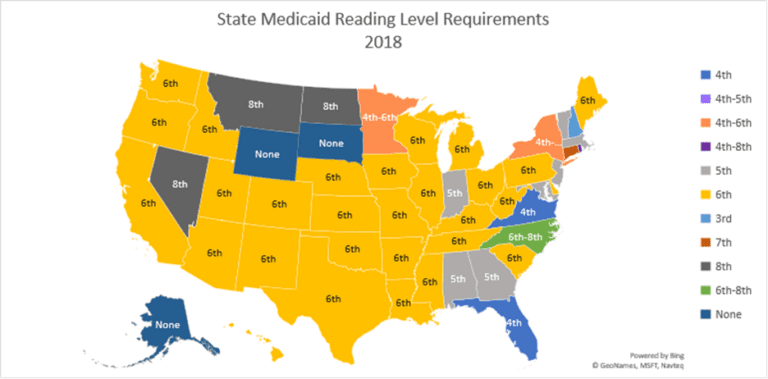Stories
Health literacy. Simple messaging. Better outcomes.
Clear, simple messaging can lead to better understanding. And this can help lead to lower pharmacy costs, better adherence and better outcomes.
May 1, 2019Investigating Medicaid’s published standards
There isn’t a current, recognized national literacy standard for Medicaid. So, we made it our mission to better understand America’s health literacy challenges. We did so by conducting our own Health Literacy Survey. This survey had three phases:
- Gathering and validating current standards from states that published criteria on their websites.
- Contacting and interviewing representatives of states that did not have Medicaid reading level requirements listed on their website.
- Conducting independent research on literacy and comparing it to our review of Medicaid material requirements.

Our investigation showed most Americans are reading at a 6th grade level, yet most health care materials are written at a 10th grade level. We also discovered literacy rates are generally lower among elderly men, racial minorities and people with limited English proficiency. In fact, we found that one fifth of American adults read at a 5th grade level or below.
The connection between literacy and health
Plainly put, we’re seeing a direct correlation between poor reading skills and low health literacy, which comes at a cost.¹
- Nine of ten Americans risk not being able to understand health information
- Fifty percent of American adults don’t take medications as directed
- Costs related to misunderstood or ignored instructions amount to over $100 billion, annually
We also found that patients with low health literacy also face a higher volume of health problems.¹
- They’re more likely to visit an emergency room
- They have trouble managing chronic diseases, like diabetes and high blood pressure
- Hospital stays are more frequent
- Treatment plans are less likely to be followed
- They have higher mortality rates
The bottom line is that it’s much harder for people to act appropriately when they don’t understand the message. To solve this problem, we apply a more effective method to providing health information.
Clarity is the best policy
At Prime Therapeutics (Prime), when it comes to providing health information, we cut to the chase. “Let’s Be Clear” is our internal guideline when writing any member-facing material. Simply put, we need members to understand what we’re saying. Their health could depend on it.
Messaging should always be:
- To someone and from someone
- Written in plain language (no higher than a 5th grade reading level or aligned with the Medicaid State Requirement)
- In the member’s language of choice (English, Spanish, etc.)
- Delivered in the member’s preferred way (email, text, etc.)
We try to:
- Never use acronyms without defining the full term
- Never use industry jargon without describing what it means
- Never ask members to take more than three steps to complete an action
Better health literacy is better for everybody
Clear messaging does more than help people read it more easily. When it comes to medicine, misunderstandings can be both costly and dangerous. We don’t take the risk, because regardless of their reading level, Prime cares for our clients’ members. We want them to have positive health outcomes. It’s a goal as simple as our message: Better messaging. Better outcomes.
- U.S. Department of Health and Human Services, Office of Disease Prevention and Health Promotion. (2010). National Action Plan to Improve Health Literacy. Washington, DC: Author. Accessed at: https://health.gov/communication/hlactionplan/pdf/Health_Literacy_Action_Plan.pdf
Related news
Stories
July 22, 2024
Introducing the latest issue of our medical and pharmacy benefit management report
The summer 2024 issue of the Magellan Rx Report provides insights on the industry’s most groundbreaking managed care solutions in some of the most complex areas of health care
Stories
July 18, 2024
Specialty drug trend forecasted to drop for employer groups, clinical experts say
Introduction of Humira® and Stelara® biosimilars contribute to continued decline in the autoimmune – anti-inflammatory trend
Stories
July 16, 2024
Prime/Magellan Rx earns top score on the Disability Equality Index
For the second consecutive year, Prime Therapeutics/Magellan Rx Management received a score of 100 on the Disability Equality Index®, which benchmarks disability workplace inclusion